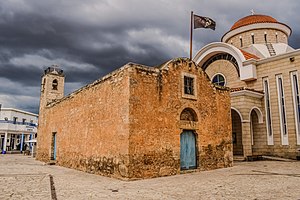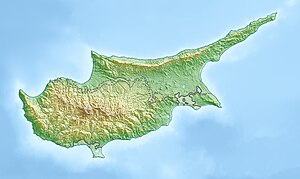Xylofagou (Greek: Ξυλοφάγου; locally [ksiloˈfau]) is a village in the Larnaca District of Cyprus, situated close to the A3 motorway between Paralimni and the British military base Dhekelia.
Xylofagou
Greek: Ξυλοφάγου | |
|---|---|
 Agios Georgios church | |
| Coordinates: 34°58′30″N 33°51′6″E / 34.97500°N 33.85167°E | |
| Country | |
| District | Larnaca District |
| Population (2011)[1] | |
• Total | 6,231 |
| Time zone | UTC+2 (EET) |
| • Summer (DST) | UTC+3 (EEST) |
| Website | xylophagou |
Overview
editXylofagou's name roughly translates to "wood eaters". It lies on the northern flank of a hill,[2] on the edge of a group of several similar villages collectively known as the Kokkinochoria (Greek: Κοκκινοχώρια) which translates to "red villages" due to their abundance of nutrient-dense red soil in which vegetables—especially the extremely popular potatoes that are eaten island-wide—are grown.[3]
Xylofagou is the site of the oldest known dwarf elephant fossils in Cyprus, assigned to the species Palaeoloxodon xylophagou and dating to around 200,000 years ago.[4] It is also home to a medieval Venetian watchtower.[5][6] Near Xylofagou is the Cave of the 40 Martyrs, where Christian soldiers sacrificed their lives in the 16th century to evade capture by the Ottomans.[7]
In 2021, to commemorate the role played by locally grown potatoes in the community's growth, a 16-foot-tall fibreglass potato statue nicknamed the "Big Potato" was erected in the village. It proved controversial, with some viral videos mocking its phallic shape.[8] Statue designer George Tasou said of the mockery, "I'm not bothered because it's brought publicity to our village, and I'm hoping it will promote the Cyprus potato around the world."[9]
References
edit- ^ "C1. POPULATION ENUMERATED BY SEX, AGE, DISTRICT, MUNICIPALITY/COMMUNITY AND QUARTER (1.10.2011)", Population - Place of Residence, 2011, Statistical Service of the Republic of Cyprus, 2014-04-17, archived from the original on 2014-04-20, retrieved 2014-04-20
- ^ Bekker-Nielsen, Tonnes (2004). The Roads of Ancient Cyprus. Museum Tusculanum Press. p. 189. ISBN 978-87-7289-956-5. Retrieved 16 March 2012.
- ^ "Kokkinochoria (Red Villages)". www.cyprusalive.com.
- ^ Athanassiou, Athanassios; Herridge, Victoria; Reese, David S.; Iliopoulos, George; Roussiakis, Socrates; Mitsopoulou, Vassiliki; Tsiolakis, Efthymios; Theodorou, George (August 2015). "Cranial evidence for the presence of a second endemic elephant species on Cyprus". Quaternary International. 379: 47–57. Bibcode:2015QuInt.379...47A. doi:10.1016/j.quaint.2015.05.065.
- ^ "The Venetian Watchtowers…". www.angloinfo.com. 20 March 2017. Retrieved 23 April 2018.
- ^ "Venetian Watchtowers Route (West Larnaka Region)". Larnaka Tourism Board. Retrieved 23 April 2018.
- ^ Bryant, Sue (27 January 2009). Frommer's Cyprus With Your Family: From the Best Family Beaches to Mountain Villages. John Wiley & Sons. p. 182. ISBN 978-0-470-72318-0. Retrieved 16 March 2012.
- ^ Castrodale, Jelisa (18 October 2021). "A Village in Cyprus Is Now Home to This 16-Foot-Tall Potato Statue". Food & Wine. Retrieved 2021-10-24.
- ^ Pitta, Antigoni (15 October 2021). "'Viral' Big Potato garners attention at home and abroad". Cyprus Mail. Retrieved 2021-10-24.
